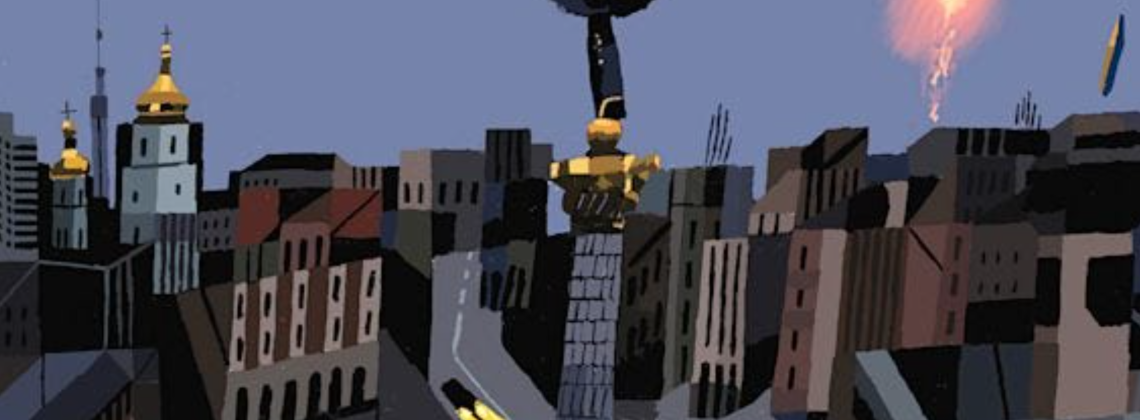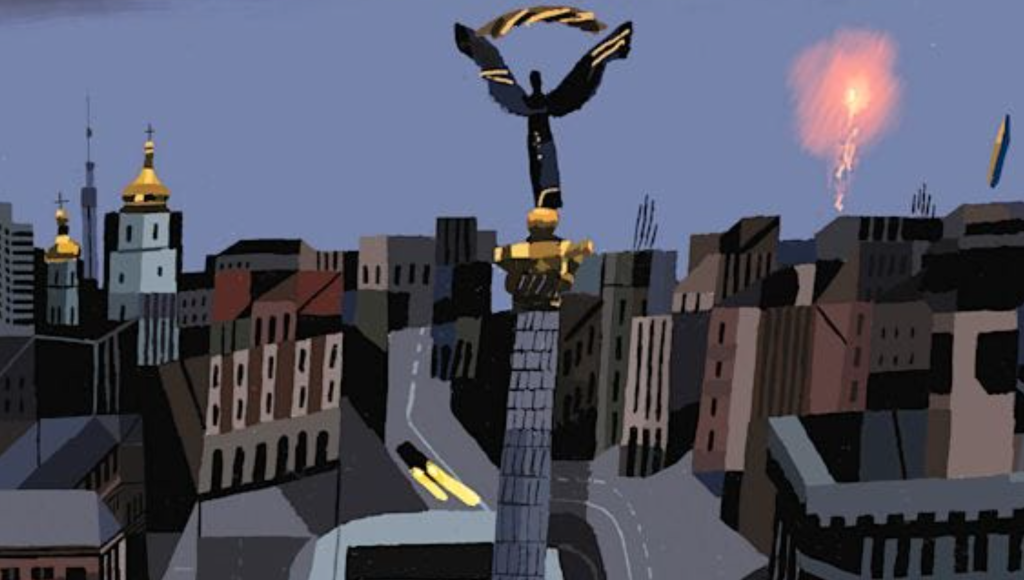

Illia Ponomarenko profiles a love that does not flee
I Will Show You How It Was: The Story of Wartime Kyiv by Illia Ponomarenko. Bloomsbury Publishing, 2024. 288 pp., $28.99
Twenty-five years ago this summer I landed in Kyiv for the very first time. I remember a ride on the crowded metro, some walking, and before long we were standing on the hilltop looking at St. Michael’s Golden-Domed Monastery on one end and St. Sophia’s Cathedral on the other. Both churches and other nearby buildings looked to me like decorated cakes in bright pastel with white trim. I had been to a few European cities by then, but this one, the capital of independent Ukraine, was something else.
Five years after that first visit I moved from Rivne, where I had been living in western Ukraine, to Kyiv. I soon found my favorite things: the quiet cobbles and the smell of incense at Pecherska Lavra (the Monastery of the Caves); the icon of Christ inside the bright yellow Volodymyrskiy Sobor (St. Volodymyr’s Cathedral); the botanical garden right across the boulevard, bursting with magnolia blossoms in April; Khreshchatyk at night, the wide central street walled by mid-century Soviet architecture; Podil, the old city neighborhood, with its white-walled buildings, old churches, quirky cafes, and a women’s monastery where I sat on a bench with a friend on a still night. War journalist Illia Ponomarenko and I agree: “If you ever get a chance to visit Kyiv, Podil is the place to go to.”
When Ponomarenko calls his memoir I Will Show You How It Was, he is talking about Russia’s full-scale invasion of Ukraine in February 2022. But he is also showing us his beloved, beautiful city.
Ponomarenko grew up in the Donbas, that part of Ukraine not free from Russian incursion since 2014. Kyiv is his adopted city, a place of freedom and creativity and possibility, a symbol for Ukraine’s past and future, altogether worth defending. It is also where Ponomarenko worked as a journalist for the Kyiv Post, and then (just before the full-scale invasion) as one of the founders of the award-winning Kyiv Independent, an English-language Ukrainian online newspaper with an active social media presence and a war crimes investigation unit that has produced a documentary on Russia’s abduction of more than 19,000 Ukrainian children.
I Will Show You How It Was is both memoir and action film, detailed journalism and personal reflection. The account invites us right into the thick of things. Readers will feel like they are sitting with Illia Ponomarenko in a beer tent in Podil as he outlines, step by step, what led to the February 2022 invasion.
Most critically, we see Putin’s pattern: Make impossible demands, make no concessions, accuse the enemy, play the victim. “Do not underestimate the lunacy of aged dictators,” Ponomarenko writes. “There’s no hidden agenda. They are no 3D chess grand masters whose plans are unfathomable to simple mortals.”
For instance, take note of this telling line from “On the Historical Unity of Russians and Ukrainians,” published on Putin’s behalf in July 2021. “Kyiv’s anti-Russian policies present the risk that Ukraine could lose its statehood.” Simple mortals ought to be able to read between the lines. Here Ukraine belongs to Russia, and Russia is in charge of whether Ukraine gets to be a state. Colonialism at its best.
Ukraine’s president, military leaders, and oligarchs are not left unscathed in this account either. Ponomarenko is a true journalist, leaving an account of omissions, failures, and betrayals. And he confesses his own temptation to flee. But aged dictators aren’t the only ones we should not underestimate. As Ponomarenko writes, “I strongly advise anyone against underestimating the frantic anger of the doomed fighting for their own homes and families.”
For me, reading this book was like watching the HBO series Chernobyl. There are the failures of world leaders, the lack of transparency, the unheeded warnings, and then the unfolding of disaster. I felt that tightness and dread, waiting for the inevitable, knowing the events depicted had irrevocably marked the lives of people I love.
Bucha, a town northwest of Kyiv and now known worldwide, is where my friend’s parents lived. Obolon, the northern residential neighborhood of Kyiv, is where another friend huddled in a shelter. Others, people I’d interviewed for my dissertation or family members of friends, were located all over Kyiv and its surrounding suburbs. When Russian military divisions surrounded the city, the West saw these locations on their television screens for the first time. The world finally learned how to say “Kyiv” in Ukrainian.
I lived on the tenth floor of an apartment just a short walk from the Akademmistechko metro station, on the westernmost end of the long east-west artery of Kyiv. Ponomarenko writes that he left the car there to hop on the metro and meet his mother at the central railway station. His mom traveled to Kyiv from Volnovakha in Donbas with nothing but her purse.
That’s my stop, I thought, underlining it in dark blue, reliving the horror of watching full-scale war unfold in February 2022. I remember watching screens with maps of Ukraine and the Russian forces surrounding the city like pincers.
Like many Ukrainians, I let the ongoing war that began in 2014 recede into the background until it touched all parts of the country, parts I knew. Now everyone has heard of Kyiv, Bucha, Mariupol. Western newscasters try to pronounce Kharkiv, though they always put the accent on the wrong syllable.
I asked my friend Roman Lebed, a Ukrainian journalist who joined the military last year, if it is possible to check the number of civilians and soldiers lost in this war. “The wound is still bleeding,” he said. Between the challenges of examining that active wound and the government’s desire to keep morale high, it can take work to discern the extent of the losses. Modest estimates from January 2024 show over 10,000 civilian deaths, and four million internally displaced and six million externally displaced citizens. Yet other reports, including Ponomarenko’s, say estimates of Mariupol’s civilian dead alone number over 20,000. And there are about 38,000 Ukrainians in the Unified Register of Persons Disappeared Under Special Circumstances, where both civilians and military personnel are entered at the request of relatives.
May of this year was the bloodiest month for civilian casualties, over half of which occurred in the city and region of Kharkiv. And on July 8 a targeted Russian missile struck Okhmatdyt, the largest children’s hospital in Ukraine.
Cities have been razed to the ground. Villages have been wiped off the map. Families have buried loved ones—civilians shot by invading troops—right in their yards.
It’s no surprise that I often hear sympathetic fellow Americans say, “It’s a shame. What a shame, what’s happening over there.”
Surely it is a shame we have not listened to Ukrainians who have tried for years to explain. It is a shame when we are led around by our noses by propaganda leveraged by our very own politicians. It is a shame when we talk with dictators over the heads of Ukrainians.
But anyone who pays attention to the way regular Ukrainians have risen to the challenge of this terrible war will be inspired with admiration and wonder. Ukrainians have stood in line to sign up to fight, have raised money to purchase weapons and gear and defense systems, have organized and petitioned and taught and written and represented their country in every field.
According to Roman Lebed, one of the things that has changed most in Ukraine is the awakened spirit of volunteerism. “We stopped asking why the government doesn’t do it. We do it.” Our society is growing up, he says. We now understand that the person who lives 700 kilometers from us on the frontline is our neighbor and worth protecting. Lebed plans to continue in the volunteer spirit after the war. “When the war ends, I won’t quit doing it. We have seen what we can do even in two or three hours a week. Why not?”
I Will Show You How It Was tells the story of a critical turning point in Ukraine’s embrace of identity and purpose. “While the larger world debated whether Kyiv would fall within forty-eight or seventy-two hours, so many in this country decided to do what was right.” Ponomarenko here celebrates President Zelensky, though he doesn’t spare him in his account of leadership failures. “When the time came, our comedian-turned-president, a leader whose popularity was in freefall, declined to escape what seemed like certain death and leave Kyiv.” Others followed suit:
And the soldiers of the 72nd Mechanized, and from so many other units, fought fiercely and died bravely at Moschun because they had faith and real hope of saving the city.
And regular people of Kyiv, untrained civilians from all walks of life, snapped up Kalashnikov rifles and prepared Molotov cocktails, ready to fight and die in the streets of Obolon.
As for myself, returning to Kyiv to fulfill my role as a journalist in one of the most dramatic episodes of modern history, was the best decision of my life.
We didn’t give up and we didn’t think about personal consequences. We had faith and hope in something larger.
I propose that something else is also at work here, tied to faith and hope: love. According to German philosopher Josef Pieper, love is based in the real. Love confirms the goodness of what is, when we recognize it and respond, “It’s good that this exists!”
We are made to love. As Pieper writes, “Our whole being is so set that it wants to be able to say with reason, ‘How good that this exists; how wonderful that you are here!’” What a powerful force love is against an enemy who is trying to wipe you from existence.
Pieper also says, “The true antithesis of love is not hate but despairing indifference, the feeling that nothing is important.” This is the force Ukrainians, and all of us, must resist. “The radical attitude of ‘not giving a damn’ in fact is in some way related to the state of mind of the damned.”
Love that defends and does not flee, love for what is, says, “It is good that you exist.” I hear this refrain in Ponomarenko’s love letter to Kyiv, and through it, to all of Ukraine. Taking us to the streets of his beautiful city, he reminds us that this fight is primarily for something. It is an embrace of the good, a defense of home, an affirmation of life in the midst of death.
Julie Durbin is Associate Professor of Humanities and Writing at Geneva College, where she directs first year English composition and the writing center. She served with Free Methodist World Missions for ten years in Ukraine and did research on worship in Ukrainian simple churches.